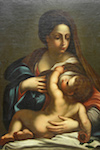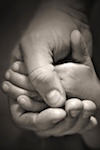 My first baby was an Advent baby. Born just a few days after the Church calendar turned over in late November, she arrived in the thick of Christ’s own birth season. As such, her birthday (and mine too, in a sense) now serves as a preface to all of my Advent meditations, forever changing the way I come into Christmas each year. It invites me to remember the vivid physicality of her birth — its pure wonder and raw intensity — and to ponder the Christmas story in light of it. Particularly the role of Mary, who was singly invited and appointed to aid in bringing deliverance to mankind through her own very natural delivery.
My first baby was an Advent baby. Born just a few days after the Church calendar turned over in late November, she arrived in the thick of Christ’s own birth season. As such, her birthday (and mine too, in a sense) now serves as a preface to all of my Advent meditations, forever changing the way I come into Christmas each year. It invites me to remember the vivid physicality of her birth — its pure wonder and raw intensity — and to ponder the Christmas story in light of it. Particularly the role of Mary, who was singly invited and appointed to aid in bringing deliverance to mankind through her own very natural delivery.
 Fidelity is not a cheap word, and it is not an easy word. Its hunger to consume every morsel of life grudgingly offered it — to yield abundance in return — is insatiable. There is no doubt that fidelity includes our sexual habits and behavior, but at the same time it becomes lost if we confine it only to sexual behavior. Fidelity invites us to better understand our relationship to everyone and everything, to enjoy the blessings of rootedness instead of enduring disorientation, and ultimately allows us a better perch for seeing and engaging reality.
Fidelity is not a cheap word, and it is not an easy word. Its hunger to consume every morsel of life grudgingly offered it — to yield abundance in return — is insatiable. There is no doubt that fidelity includes our sexual habits and behavior, but at the same time it becomes lost if we confine it only to sexual behavior. Fidelity invites us to better understand our relationship to everyone and everything, to enjoy the blessings of rootedness instead of enduring disorientation, and ultimately allows us a better perch for seeing and engaging reality.
 Like any matter of taste, reading well is an exercise in preference, but as I consider the discovery of most of my favorite and abiding titles, I find that each one either came from following a strong writer, mimicking a good reader, or trusting a well-regarded “leader.” And, more often than not, the best of the best cross-check against all three!
Like any matter of taste, reading well is an exercise in preference, but as I consider the discovery of most of my favorite and abiding titles, I find that each one either came from following a strong writer, mimicking a good reader, or trusting a well-regarded “leader.” And, more often than not, the best of the best cross-check against all three!
 Where I once thought of my vocation or calling in somewhat linear, marked-trailhead sort of terms — hoping to discern the all-inclusive single occupation best matched to my personality profile, or to divinely sense the most intuitive, singularly direct path for making a positive difference in the world — my experience has instead felt more like wandering-with-intention toward the next little rock pile where I inevitably see more of the terrain that lies before me.
Where I once thought of my vocation or calling in somewhat linear, marked-trailhead sort of terms — hoping to discern the all-inclusive single occupation best matched to my personality profile, or to divinely sense the most intuitive, singularly direct path for making a positive difference in the world — my experience has instead felt more like wandering-with-intention toward the next little rock pile where I inevitably see more of the terrain that lies before me.
 At every turn, I find that I know and believe that artists matter significantly for the ways they capture a culture, how they generate artifacts that point to the values and priorities and perspective of a generation, and how they wave the flag on overlooked issues. But over the past few months, I have wanted to know better why the poet, specifically, matters. Not just those who write and publish poems literally, but those who serve as a voice in the wilderness — the seers, the prophets, those who get something that others can’t yet get.
At every turn, I find that I know and believe that artists matter significantly for the ways they capture a culture, how they generate artifacts that point to the values and priorities and perspective of a generation, and how they wave the flag on overlooked issues. But over the past few months, I have wanted to know better why the poet, specifically, matters. Not just those who write and publish poems literally, but those who serve as a voice in the wilderness — the seers, the prophets, those who get something that others can’t yet get. Despite my deep longing to be among the ranks of what I call the “true” artists, the kind who can effortlessly dress themselves in wonderfully whimsical, sophisticated clothing and decorate their homes with lovely abstract art that has deep roots in poetic allusion, I am really too poorly dressed and my home too pathetically decorated to ever count myself among their ranks.
Despite my deep longing to be among the ranks of what I call the “true” artists, the kind who can effortlessly dress themselves in wonderfully whimsical, sophisticated clothing and decorate their homes with lovely abstract art that has deep roots in poetic allusion, I am really too poorly dressed and my home too pathetically decorated to ever count myself among their ranks. The remarkable thing about the non-celebrity crush, then, is what it says about the crush-er, so to speak. The unsuspecting object of your enthusiastic esteem serves as an indicator of something you yourselves aspire to do. Just as the celebrity culture feeds on those who long to attach their identity to an admired other, the object of your own great admiration tells you quite a bit about your own loves and longings. It tells you a little bit more about how you aspire to contribute to your world.
The remarkable thing about the non-celebrity crush, then, is what it says about the crush-er, so to speak. The unsuspecting object of your enthusiastic esteem serves as an indicator of something you yourselves aspire to do. Just as the celebrity culture feeds on those who long to attach their identity to an admired other, the object of your own great admiration tells you quite a bit about your own loves and longings. It tells you a little bit more about how you aspire to contribute to your world. If indeed “the medium is the message” there is something lacking, something too sterile and quick about holding hard plastic instead of bending a dog ear, penciling a note, or marking a beautiful scene or character to trace as my daughter likes to do. Indeed, a well-worn storybook is perhaps the most compelling evidence that our best reading — our best learning — is not primarily compelled by will but by love.
If indeed “the medium is the message” there is something lacking, something too sterile and quick about holding hard plastic instead of bending a dog ear, penciling a note, or marking a beautiful scene or character to trace as my daughter likes to do. Indeed, a well-worn storybook is perhaps the most compelling evidence that our best reading — our best learning — is not primarily compelled by will but by love.













